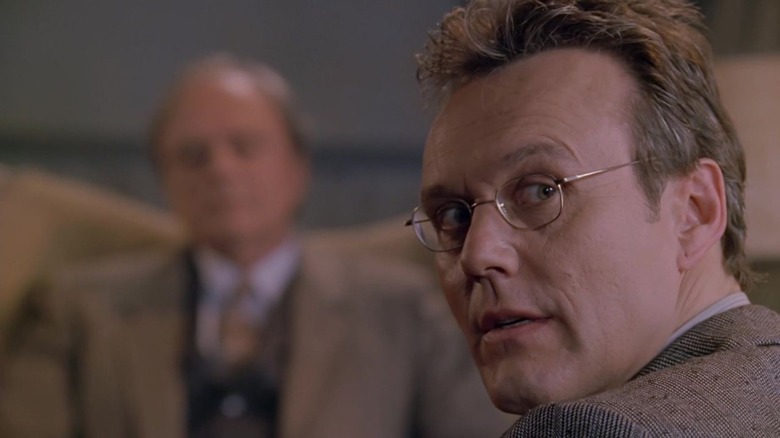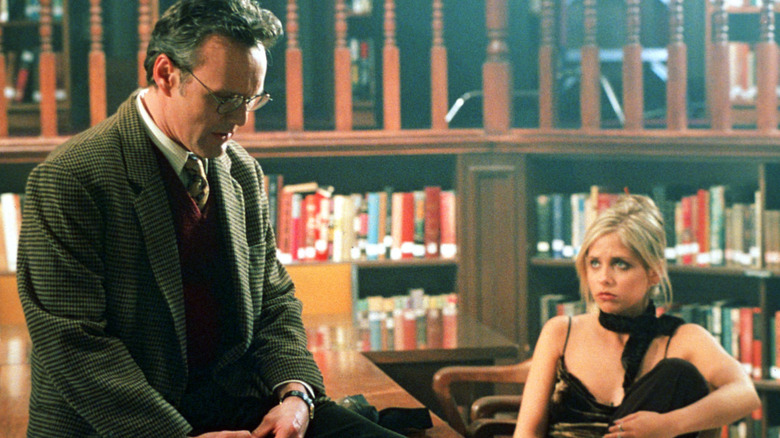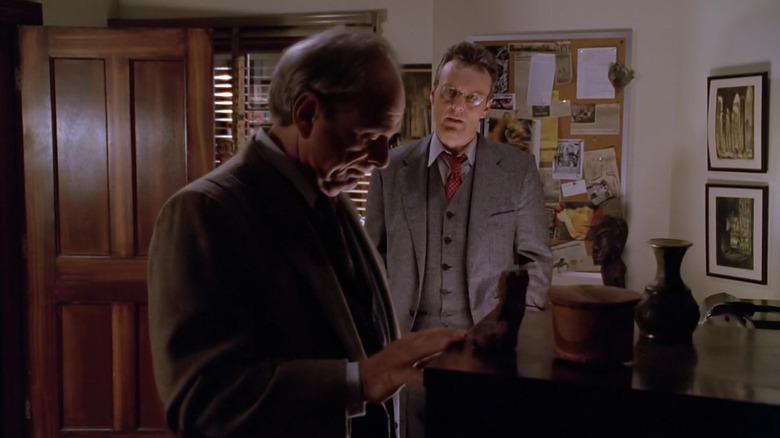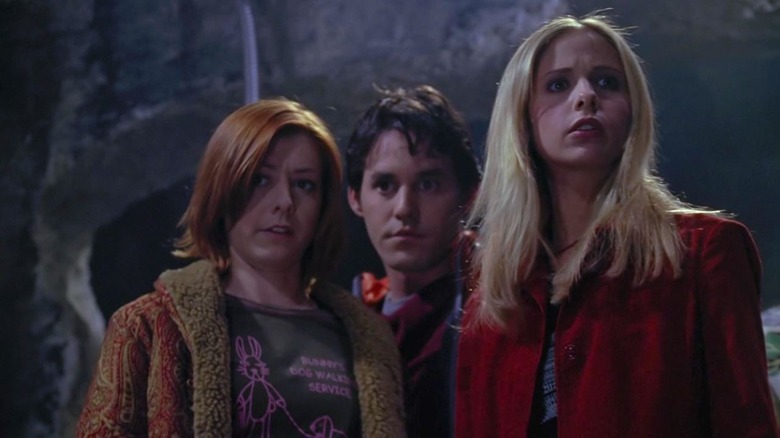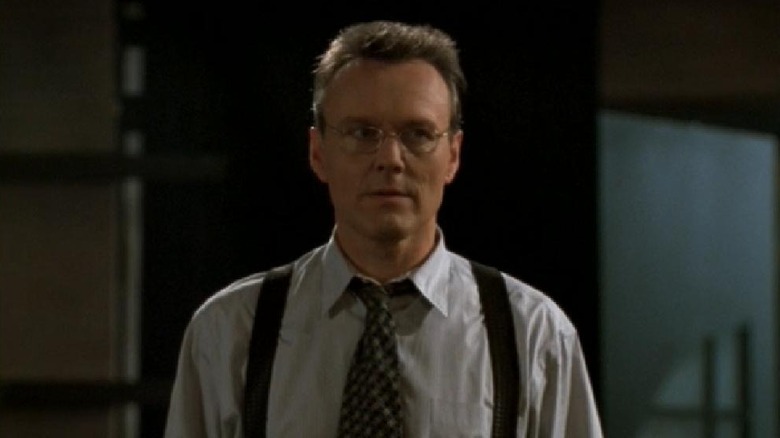Why Giles Had To Be Fired For One Buffy Writer To Be Hired
Some of the best episodes of TV were written before the writer was even hired. The staff that writes great television like "Buffy the Vampire Slayer" usually starts out by writing a spec script — in plain English, they script an original episode of the series within the framework laid out by the series creator and the writers. Some of the most memorable moments of the entire show have originated this way, including Giles getting thrown out of the Watchers' council. The spec script that got David Fury hired as the main writer of the season 3 episode "Helpless." However, not everything from his initial pitch made its way into the episode.
In the 12th episode of the season that follows Buffy's final year as a student at Sunnydale High, she starts to grapple with the authority figures in her life in a new way — her final boss is the town mayor, after all. Her relationship with Giles is put to the test in "Helpless" when Giles is forced to drug Buffy and render her powerless for a test organized by the Watchers' Council. In the end he saves Buffy from a demon, causing her to fail the test and for him to be fired. From that point forward, Giles is not technically Buffy's Watcher and remains in her life out of sheer loyalty, not obligation.
Giles getting fired was in Fury's initial pitch for the episode. However, he saw things starting and ending a little differently.
Buffy fails the Watchers' test, costing Giles his job
Buffy losing her powers ended up being a major plot point in the season 3 episode of the hit series, but it was tweaked slightly from Fury's initial pitch. He imagined that instead of the Watchers taking away her physical powers, they would tamper with her foundation of emotional strength in her loved ones.
"My original pitches that Buffy was going to be drugged by Giles, but she was going to hallucinate and think that her friends had become vampires and she comes home and her mother's a vampire," the writer recalled in an interview for the book Slayers & Vampires. "Basically, it was a way of taking away her support group [...] I pitched that and they liked it, but I think they had just come up with the 'The Wish,' where Willow is a vampire and different people from her life are vampires, so they couldn't do that. Joss [Whedon, series creator] came up with the idea of taking Buffy's powers away."
The Watchers Council was always opposed to Buffy having close friends and the threat that it posed to her — loved ones created easy targets for enemies to bait the Slayer into a trap. However, seeing Buffy without her powers was also an interesting twist — in the end, it was her emotional support system that saved her.
Even though he was the one who pitched Giles getting fired when Buffy fails the test, Fury never imagined that the British librarian would be permanently barred from being Buffy's Watcher. But Whedon had other plans, and this episode came to shape their relationship for the rest of the series.
Giles was supposed to get his job back in the end
Before writing on "Buffy the Vampire Slayer," Fury had worked mostly on sitcoms like the ABC series "Life's Work" or cartoons like "Pinky and the Brain." The writer was used to working in an episodic formula, where little to nothing that happens in the series has consequences for more than a single episode. If "Buffy" was an episodic series, Giles would have gotten his job back before the episode ended. Fury imagined that Giles would be fired at "the midpoint of the episode, and by the end Buffy does something to somehow make amends and Giles gets rehired again." However, he didn't expect Whedon to get so attached to Giles' firing.
"But the thing that Joss really responded to was, 'Oh my God, Giles gets fired,'" Fury continued, "he just wanted that. It's an episode where Giles is no longer a Watcher. I was going, 'I don't want to lose Giles' job. I pitched this, but I wanted him to get his job back.' Somehow the idea became a permanent part of the mythology of the show. "
Fury's pitch for "Helpless" ended up opening the door for him to write more and more episodes on the series, but it was not the first "Buffy" episode he penned — he also co-wrote the season 2 episode "Go Fish" with Elin Hampton. However, it's plausible that Hampton was the one to pitch this episode, not Fury, and that "Helpless" was Fury's first successful pitch in the "Buffy" writers' room. This paved the way for his long-standing stint on the writing staff there and even earned him producer credits in the final four seasons of the series.
The series creator wrote spec scripts of his own before Buffy
The creator of "Buffy" also got his start as a TV writer working on a sitcom — his very first job was as a staff writer on "Roseanne." He also wrote spec scripts for a number of other shows while he was looking for a writing job, including "The Wonder Years," he revealed to IGN. Whedon's father worked as a television writer as well, primarily for the show "It's A Living." That show was among five that Whedon wrote spec scripts for before landing his job on "Roseanne."
The script that got Whedon his first-ever writing gig was "about getting mugged," which could have been used as the inspiration for several episodes on the show. "Stand On Your Man" finds Roseanne in self-defense classes after an uncomfortable run-in with strangers. In "Tolerate Thy Neighbor," her house is robbed. And in the two-part episode "Crime and Punishment," the show grapples with the ethics of physical altercations and appropriate discipline. The "Buffy" creator claims that he researched getting mugged "extensively," and some of that research probably made it into some of those episodes. It's likely that his knowledge of crime came in handy while writing his first real episode for the show, "The Little Sister," in which Roseanne's sister Jackie expresses interest in joining the Police Academy and Roseanne tries to talk her out of it.
Whedon then went on to write the satirical B-movie about a vampire-hunting blonde that would become the hit series that would inspire other writers, like Fury, to write spec scripts of their own.
'Buffy' is about the writers' deepest fears
"Buffy" followed a pretty solid formula for new writers to dig into. At the show's symbolic core, the problems of adolescence are embodied by the supernatural, like a shy girl turning invisible in "Out of Mind, Out of Sight." The writers had to dig deep into their own teenage nightmares for source material, with some pretty embarrassing results. James Marsters, who plays Spike as a series regular in the latter half of the show, explained the writing process in an interview with Radio Times:
"One of the reasons the Buffy writing was so good was that, to come up with an episode, the writers were being asked to come up with their worst day, the day that they don't talk about, the day that keeps them up at night, when they really got hurt or when they really hurt someone," And then, metaphorically speaking, slap fangs on top of their dark secret, write a story about it and let the whole world know about it."
The stories were so revealing they even felt embarrassing for writers like Fury. "When you would come down to a set and you would see the writer on that episode, they would almost look ashamed," Marsters continued. "Because I think they were afraid that they would be found out, that you would guess what they were actually writing about, and they didn't want you to know that dark secret. It was a sustained act of vulnerability and courage from a core of really talented writers."
Since "Buffy" writers were asked to write about their fears, it makes sense that Fury wrote about job insecurity in order to land himself a job. Interestingly enough, Whedon wrote about getting mugged to land his "Roseanne" gig — another story that revolves around being broke.
Did Whedon make the right call by changing the 'Helpless' script?
"Helpless" is definitely a dark turn for Giles at first. It's jarring to see him purposefully try to hurt Buffy — to disarm her and stab her with a needle is shockingly cruel, even for the sake of her training. It only makes sense that he would stop the Watchers' Council from truly putting her in harm's way. His momentary betrayal is redeemed when he intervenes on Buffy's behalf and saves her.
Even though being a Watcher had defined Giles as a character up until that point, Whedon made the right call by severing Giles' ties from the council. That was the moment when he truly transformed from Buffy's designated chaperone to her voluntary paternal figure. Not only is his assistance offered of his own volition, but Buffy's continued practice under his tutelage is also no longer her obligation. In fact, she rebels against the Council by resisting a new Watcher and remains faithful to Giles.
This new element in the "Buffy" canon adds a unique dimension to this central relationship that defines it in the rest of the series. The controversial series creator definitely made the right call by making Giles' firing a canon event. Between Fury's idea and Whedon's tweaks, "Helpless" is a sleeper hit episode that shapes Buffy's transition out of high school and into the "real" world.
